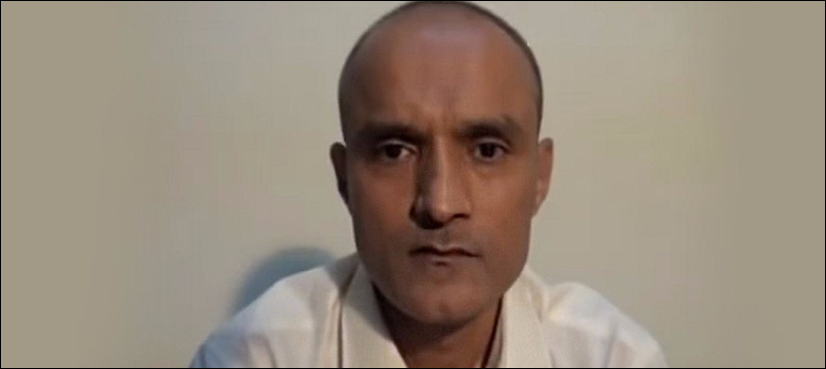HAGUE: Pakistan’s counsel in Kulbhushan Jadhav case defended the country’s handling of Indian spy before the International Court of Justice (ICJ) as the UN organ held public hearing regarding the death sentence awarded to the spy in Pakistan, ARY News reported on Monday.
SCROLL DOWN TO WATCH INDIA’S COUNSEL’S ARGUMENTS
With strong words and arguments, Pakistan’s counsel in the case, Khawar Qureshi and Director General of South Asia in Foreign Office, Dr Muhammad Faisal told the ICJ that:
Pakistan doesn’t see the merit in a state which sends a spy and is seeking access to a tool for terror
There has been deafening silence from India on Pakistan’s accusations on Jadhav
India has been unable to provide an explanation for Jadhav’s passport which bears a Muslim name
India’s allegation regarding kidnap of its spy is not true and he was arrested on Pakistani soil
Kulbhushan Jadhav has 150 days to appeal sentence
Vienna Convention provisions not intended to apply to a ‘spy’ involved in terror activities
Commonwealth nations are usually excluded from ICJ jurisdiction
ICJ has reserved its judgement in the case.


India had instituted proceedings against Pakistan, accusing Pakistan of “egregious violations of the Vienna Convention on Consular Relations” in the matter of the detention and trial of an Indian national, Mr. Kulbhushan Sudhir Jadhav.
India had contended that it was not informed of Mr. Jadhav’s detention until long after his arrest and that Pakistan failed to inform the accused of his rights. It further alleged that, in violation of the Vienna Convention, the authorities of Pakistan are denying India its right of consular access to Mr. Jadhav, despite its repeated requests.
India, in its application, also claimed that it learned about the death sentence against Mr. Jadhav from a press release.
India sought the following reliefs:
(1) A relief by way of immediate suspension of the sentence of death awarded to the accused.
(2) A relief by way of restitution in interregnum by declaring that the sentence of the military court arrived at, in brazen defiance of the Vienna Convention rights under Article 36, particularly Article 36[,] paragraph 1 (b), and in defiance of elementary human rights of an accused which are also to be given effect as mandated under Article 14 of the 1966 International Covenant on Civil and Political Rights, is violative of international law and the provisions of the Vienna Convention.
(3) Restraining Pakistan from giving effect to the sentence awarded by the military court, and directing it to take steps to annul the decision of the military court as may be available to it under the law in Pakistan.
(4) If Pakistan is unable to annul the decision, then this Court to declare the decision illegal being violative of international law and treaty rights and restrain Pakistan from acting in violation of the Vienna Convention and international law by giving effect to the sentence or the conviction in any manner, and directing it to release the convicted Indian National forthwith.
BACKGROUND
Pakistani security agencies on March 24, 2016 apprehended an ‘on-duty RAW agent’ from Balochistan. The suspect was said to be an officer of the Indian navy working for the covert agency to destabilize Pakistan.
The operative had contacts with banned organizations and was working on plans to break Karachi and Balochistan away from Pakistan, and to sabotage the billion dollar China-Pakistan Economic Corridor (CPEC) project.
On March 25, a day after the arrest, the Indian Ministry of External Affairs said the Indian man arrested from Balochistan has no connection with the government, however, admitted that Kulbhushan Yadav is a former officer of the Indian navy.
“He (Jadhav) acquired premature retirement from the Indian navy and since then the government has nothing to do with him,” said Vikas Swarup, a spokesperson for the Ministry of External Affairs, requesting Pakistan to grant counsellor access to the ‘arrested Indian citizen’.
On April 10, COAS, Gen Qamar Javed Bajwa confirmed his death sentence awarded by Field General Court Martial (FGCM).
The spy was tried through (FGCM) under Pakistan Army Act (PAA) and awarded death sentence.
Jadhav was tried by FGCM under section 59 of Pakistan Army Act (PAA) 1952 and Section 3 of official Secret Act of 1923. FGCM found Kulbushan Sudhir Yadhav guilty of all the charges.
He confessed before a Magistrate and the Court that he was tasked by RAW to plan, coordinate and organize espionage / sabotage activities aiming to destabilize and wage war against Pakistan by impeding the efforts of Law Enforcement Agencies for restoring peace in Balochistan and Karachi.
WHAT IS ICJ
The International Court of Justice (ICJ) is the principal judicial organ of the United Nations. It was established by the United Nations Charter in June 1945 and began its activities in April 1946. The seat of the Court is at the Peace Palace in The Hague (Netherlands).
Of the six principal organs of the United Nations, it is the only one not located in New York. The Court has a twofold role: first, to settle, in accordance with international law, legal disputes submitted to it by States (its judgments have binding force and are without appeal for the parties concerned); and, second, to give advisory opinions on legal questions referred to it by duly authorized United Nations organs and agencies of the system.
The Court is composed of 15 judges elected for a nine-year term by the General Assembly and the Security Council of the United Nations. Independent of the United Nations Secretariat, it is assisted by a Registry, its own international secretariat, whose activities are both judicial and diplomatic, as well as administrative.
The official languages of the Court are French and English. Also known as the “World Court”, it is the only court of a universal character with general jurisdiction.


Leave a Comment